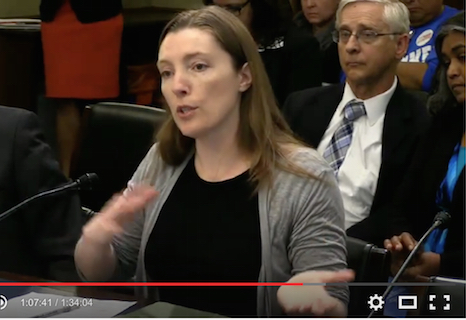This week, I had the opportunity to share ILSR’s research with members of Congress at a hearing organized by the Congressional Progressive Caucus. The forum, chaired by Representatives Keith Ellison and Raúl Grijalva, focused on how federal contracting and other forms of financial support for business should be overhauled to reflect American values and build the kind of economy we need. The hearing featured perspectives from both low-wage workers and independent businesses.
As I noted in my testimony, much of federal policy now works to bend the marketplace in favor of big corporations, putting both workers and small businesses at a competitive disadvantage. Federal subsidies, tax credits, loan guarantees, and other public benefits skew heavily in favor of large, low-wage corporations over responsible small businesses.
I highlighted one opportunity in particular for reform: loan guarantees provided by the U.S. Small Business Administration (SBA). Over the last ten years, the SBA has backed loans to over 30,000 retail and fast food franchises, like Quiznos and Subway. Not only do these outlets often pay rock-bottom wages, but the local entrepreneurs who ostensibly own these businesses generally have very little control over them and forfeit much of the revenue to the franchise parent company. Worse, more than one in four of these businesses failed, leaving both the local owner and the SBA on the hook, while the franchise parent company made off with sizable profits and no liability for the default.
The eligibility criteria for SBA loan guarantees, ILSR believes, should be revised to eliminate support for low-wage franchises and instead expand lending for independent businesses that contribute to the well-being of their communities.
Watch a video with excerpts from this testimony here.
Testimony of Stacy Mitchell
Co-Director, Institute for Local Self-Reliance
Ad Hoc Hearing of the Congressional Progressive Caucus
April 15, 2015
Good afternoon, Congressman Grijalva, Congressman Ellison, and other members of the Congressional Progressive Caucus. Thank you for the opportunity to testify here today.
My name is Stacy Mitchell. I am co-director of the Institute for Local Self-Reliance, a 40-year-old nonprofit research organization. We develop and advocate for policies that enable communities to take charge of their local economies and build a more equitable, just, and sustainable future.
At its heart, today’s forum is about how to ensure that federal contracting and other forms of financial support for businesses reflect American values and build the kind of economy we need. When federal spending favors large, low-wage corporations, workers are not the only ones harmed. So too are small, independent businesses.
Over the last 15 years, the overall market share of small firms — those with fewer than 100 employees — has plunged, falling from 33 to 28 percent.[1] Main Street retail businesses have been especially hard hit. There are nearly 80,000 fewer small retailers today than there were in 1999.[2] Starting a new business has also become much harder. Although we like to imagine ourselves as a nation of startups, the actual number of new businesses created annually has declined by 20 percent since the 1970s.[3]
The decline of small business, according to a growing body of research, is harming our economy, weakening our ability to create jobs, and undermining the well-being of our communities.[4] A recent study from the Federal Reserve Bank of Atlanta, for example, found that counties in which locally owned businesses account for a larger share of the economy had higher income and employment growth, and reduced poverty rates, over the last decade, compared with counties in which large, absentee-owned businesses dominate.[5]
It’s tempting to dismiss the decline of small business as simply the result of market forces. But that view ignores the political influence of large corporations. Much of federal policy now works to bend the marketplace in their favor, putting both workers and small businesses at a competitive disadvantage. Federal subsidies, grants, tax credits, loan guarantees, and other forms of financial support all heavily favor large, low-wage corporations over responsible small businesses.[6] Tax loopholes likewise tilt the playing field, resulting in small businesses paying an effective federal tax rate that is several points higher than that paid by big corporations.[7]
Even the U.S. Small Business Administration (SBA), in some respects, caters to the needs of the world’s largest and lowest-paying corporations. Between 2003 and 2012, the SBA, under its flagship 7(a) loan program, backed over 32,000 loans to fast-food and other retail franchises, like Quiznos, Subway, and Cold Stone Creamery.[8] Many of these outlets pay poverty wages, and the local owners are often themselves victims of the franchise companies. These aspiring entrepreneurs have very little control over the businesses they ostensibly own and are required to forfeit such a large share of their revenue to the franchisor that they often earn very little.[9]
Worse still, many are doomed to failure. According to the Government Accountability Office, 28 percent of the franchise outlets backed by the SBA in the last decade failed.[10] The only winners in these deals were the big franchise parent companies. They earned new franchise fees without incurring any risk. As the Wall Street Journal noted, “High failure rates aren’t necessarily a problem for franchisers as they can still consistently generate millions of dollars in revenue every year from sales of new units.”[11]
Meanwhile, small independent businesses are starving for credit. In January, we surveyed over 3,000 independent businesses and found that, of those looking to grow, 30 percent reported being unable to secure a loan to do so. The figures were even higher for businesses owned by women (35 percent) and people of color (44 percent).[12]
As you may know, the SBA is currently reviewing its policy regarding the eligibility of franchises for federal loan guarantees. We hope members of Congress will urge the agency to make substantial changes. We believe the SBA should cease offering loan guarantees to low-wage franchises and shift that support to independent businesses. Indeed, federal statute requires that the SBA support only businesses that are “independently owned and operated.”[13] We believe that the contractual terms governing most franchise relationships are such that these establishments hardly qualify as “independent.”
This is just one of several ways we believe public spending and support for business needs to be overhauled to create a level playing field for both small businesses and workers. We urgently need to reorient federal economic policy to reflect American values of opportunity, fairness, and entrepreneurship.
Thank you again for the opportunity to contribute to this critical discussion.
Notes:
[1] Institute for Local Self-Reliance analysis of U.S. Census data.
[2] Ibid.
[3] Barry C. Lynn and Lina Khan, “The Slow-Motion Collapse of American Entrepreneurship,” Washington Monthly, July/August 2012.
[4] See “Key Studies: Why Local Matters,” at www.ilsr.org.
[5] Anil Rupasingha, Locally Owned: Do Local Business Ownership and Size Matter for Local Economic Well-being Federal Reserve Bank of Atlanta, August 2013.
[6] Two-thirds of the $68 billion in business grants and special tax credits awarded by the federal government over the past 15 years went to big corporations. Good Jobs First, Uncle Sam’s Favorite Corporations, March 2015.
[7] Effective Federal Income Tax Rates Faced By Small Businesses in the United States, U.S. Small Business Administration, April 2009.
[8] U.S. Government Accountability Office, Small Business Administration: Review of 7(a) Guaranteed Loans to Select Franchisees, September 2013.
[9] Josh Freedman, “Big Whopper Economics,” Washington Monthly, March/April/May 2014.
[10] Ibid.
[11] Sarah E. Needleman, “Franchise Brands With Higher-Than-Average Default Rates,” Wall Street Journal, September 10, 2014.
[12] Institute for Local Self-Reliance, 2015 Independent Business Survey, February 11, 2015.
[13] 15 U.S. Code § 632.





